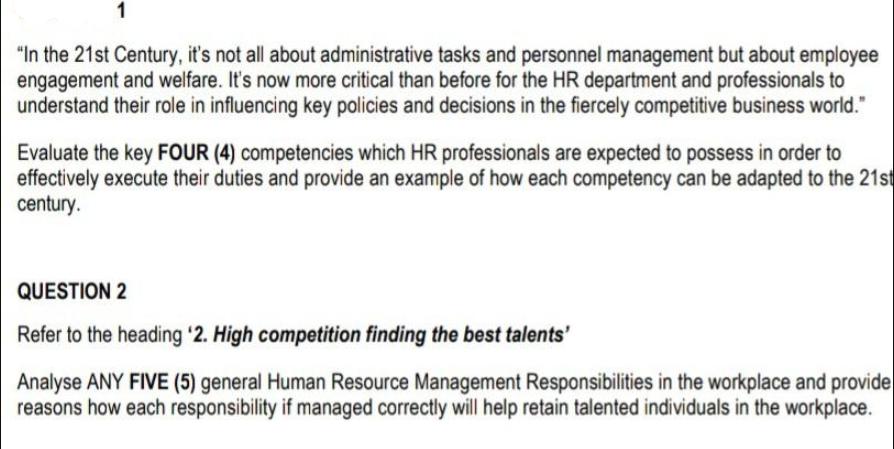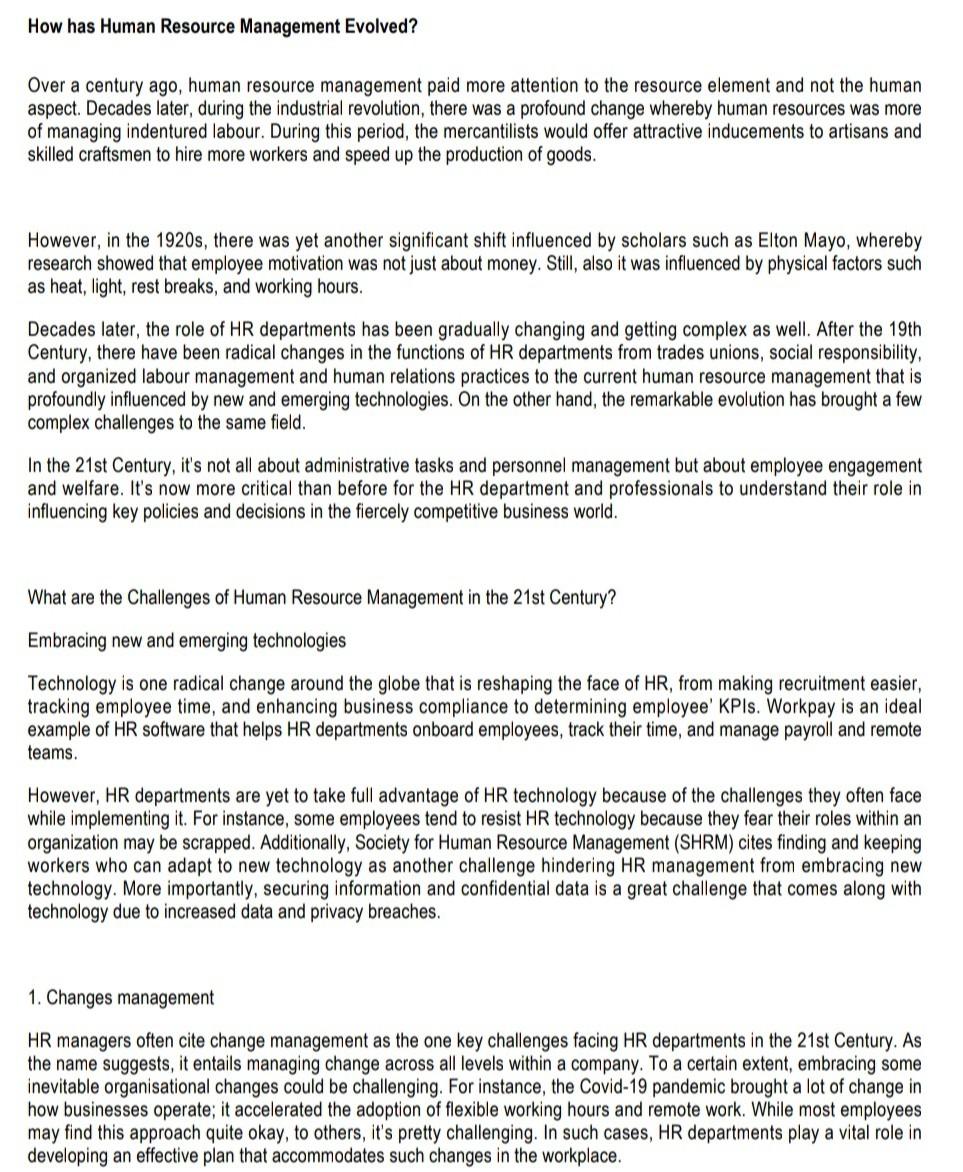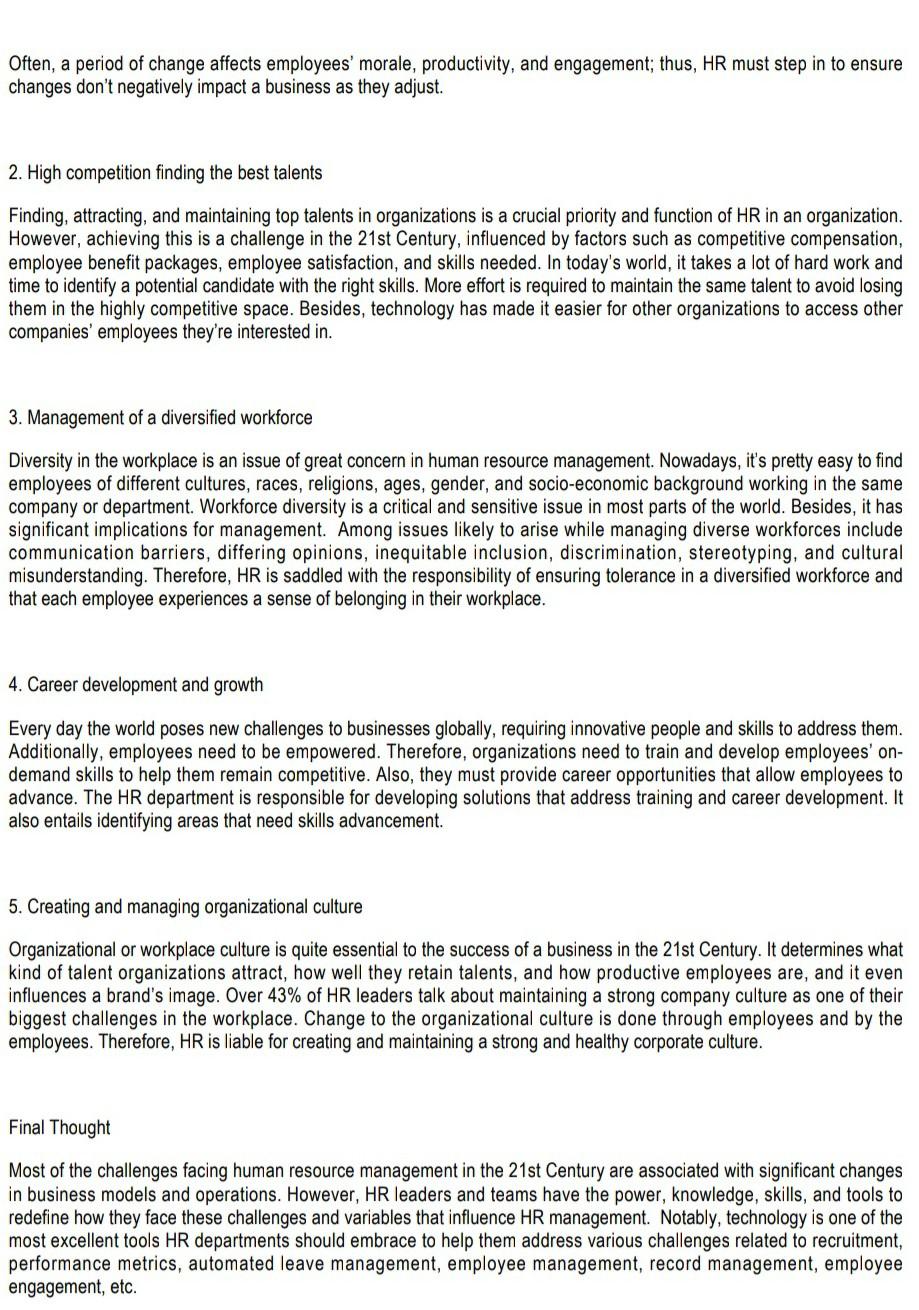Answered step by step
Verified Expert Solution
Question
1 Approved Answer
1 In the 21st Century, it's not all about administrative tasks and personnel management but about employee engagement and welfare. It's now more critical



1 "In the 21st Century, it's not all about administrative tasks and personnel management but about employee engagement and welfare. It's now more critical than before for the HR department and professionals to understand their role in influencing key policies and decisions in the fiercely competitive business world." Evaluate the key FOUR (4) competencies which HR professionals are expected to possess in order to effectively execute their duties and provide an example of how each competency can be adapted to the 21st century. QUESTION 2 Refer to the heading '2. High competition finding the best talents' Analyse ANY FIVE (5) general Human Resource Management Responsibilities in the workplace and provide reasons how each responsibility if managed correctly will help retain talented individuals in the workplace. How has Human Resource Management Evolved? Over a century ago, human resource management paid more attention to the resource element and not the human aspect. Decades later, during the industrial revolution, there was a profound change whereby human resources was more of managing indentured labour. During this period, the mercantilists would offer attractive inducements to artisans and skilled craftsmen to hire more workers and speed up the production of goods. However, in the 1920s, there was yet another significant shift influenced by scholars such as Elton Mayo, whereby research showed that employee motivation was not just about money. Still, also it was influenced by physical factors such as heat, light, rest breaks, and working hours. Decades later, the role of HR departments has been gradually changing and getting complex as well. After the 19th Century, there have been radical changes in the functions of HR departments from trades unions, social responsibility, and organized labour management and human relations practices to the current human resource management that is profoundly influenced by new and emerging technologies. On the other hand, the remarkable evolution has brought a few complex challenges to the same field. In the 21st Century, it's not all about administrative tasks and personnel management but about employee engagement and welfare. It's now more critical than before for the HR department and professionals to understand their role in influencing key policies and decisions in the fiercely competitive business world. What are the Challenges of Human Resource Management in the 21st Century? Embracing new and emerging technologies Technology is one radical change around the globe that is reshaping the face of HR, from making recruitment easier, tracking employee time, and enhancing business compliance to determining employee' KPIs. Workpay is an ideal example of HR software that helps HR departments onboard employees, track their time, and manage payroll and remote teams. However, HR departments are yet to take full advantage of HR technology because of the challenges they often face while implementing it. For instance, some employees tend to resist HR technology because they fear their roles within an organization may be scrapped. Additionally, Society for Human Resource Management (SHRM) cites finding and keeping workers who can adapt to new technology as another challenge hindering HR management from embracing new technology. More importantly, securing information and confidential data is a great challenge that comes along with technology due to increased data and privacy breaches. 1. Changes management HR managers often cite change management as the one key challenges facing HR departments in the 21st Century. As the name suggests, it entails managing change across all levels within a company. To a certain extent, embracing some inevitable organisational changes could be challenging. For instance, the Covid-19 pandemic brought a lot of change in how businesses operate; it accelerated the adoption of flexible working hours and remote work. While most employees may find this approach quite okay, to others, it's pretty challenging. In such cases, HR departments play a vital role in developing an effective plan that accommodates such changes in the workplace. Often, a period of change affects employees' morale, productivity, and engagement; thus, HR must step in to ensure changes don't negatively impact a business as they adjust. 2. High competition finding the best talents Finding, attracting, and maintaining top talents in organizations is a crucial priority and function of HR in an organization. However, achieving this is a challenge in the 21st Century, influenced by factors such as competitive compensation, employee benefit packages, employee satisfaction, and skills needed. In today's world, it takes a lot of hard work and time to identify a potential candidate with the right skills. More effort is required to maintain the same talent to avoid losing them in the highly competitive space. Besides, technology has made it easier for other organizations to access other companies' employees they're interested in. 3. Management of a diversified workforce Diversity in the workplace is an issue of great concern in human resource management. Nowadays, it's pretty easy to find employees of different cultures, races, religions, ages, gender, and socio-economic background working in the same company or department. Workforce diversity is a critical and sensitive issue in most parts of the world. Besides, it has significant implications for management. Among issues likely to arise while managing diverse workforces include communication barriers, differing opinions, inequitable inclusion, discrimination, stereotyping, and cultural misunderstanding. Therefore, HR is saddled with the responsibility of ensuring tolerance in a diversified workforce and that each employee experiences a sense of belonging in their workplace. 4. Career development and growth Every day the world poses new challenges to businesses globally, requiring innovative people and skills to address them. Additionally, employees need to be empowered. Therefore, organizations need to train and develop employees' on- demand skills to help them remain competitive. Also, they must provide career opportunities that allow employees to advance. The HR department is responsible for developing solutions that address training and career development. It also entails identifying areas that need skills advancement. 5. Creating and managing organizational culture Organizational or workplace culture is quite essential to the success of a business in the 21st Century. It determines what kind of talent organizations attract, how well they retain talents, and how productive employees are, and it even influences a brand's image. Over 43% of HR leaders talk about maintaining a strong company culture as one of their biggest challenges in the workplace. Change to the organizational culture is done through employees and by the employees. Therefore, HR is liable for creating and maintaining a strong and healthy corporate culture. Final Thought Most of the challenges facing human resource management in the 21st Century are associated with significant changes in business models and operations. However, HR leaders and teams have the power, knowledge, skills, and tools to redefine how they face these challenges and variables that influence HR management. Notably, technology is one of the most excellent tools HR departments should embrace to help them address various challenges related to recruitment, performance metrics, automated leave management, employee management, record management, employee engagement, etc.
Step by Step Solution
★★★★★
3.41 Rating (154 Votes )
There are 3 Steps involved in it
Step: 1
It appears you have shared an image that contains text regarding Human Resource Management HRM evolution challenges and some questions related to the topic Based on the text in the image I will addres...
Get Instant Access to Expert-Tailored Solutions
See step-by-step solutions with expert insights and AI powered tools for academic success
Step: 2

Step: 3

Ace Your Homework with AI
Get the answers you need in no time with our AI-driven, step-by-step assistance
Get Started


